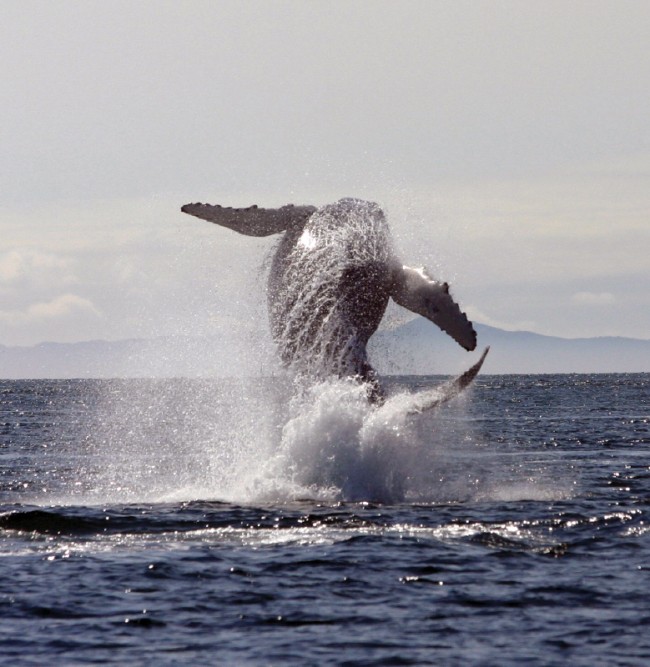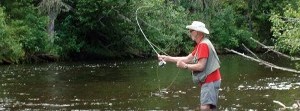
Citizenship for Whales?
“There!” cried a woman, pointing out the portside window. Far out on the ocean horizon we could see it: the characteristic spout of a humpback whale.
A diverse group of us—retirees, parents and children—were northwest of Prince Rupert on a 72-foot catamaran called The Inside Passage. We were excitedly clustered along windows and lining the rails on deck, looking for whales.
The catamaran engines revved up and we headed toward the last sighting. People scrambled for cameras and peered through field glasses. Some of us held our breath.
“There!” another passenger hissed from beneath his binoculars, and he pointed. Sure enough, arching through the surface several hundred yards away was at least one humpback—maybe more.
Throughout the afternoon we crisscrossed an area of perhaps 100 or 120 square kilometres. We encountered several individual humpbacks and several pods of orcas. One humpback breached only a few dozen metres off the port side as we were motoring back toward harbour.
It was only a tourist outing. There were no scientific experiments planned or systematic observations. We seemed to be seeking a thrill different from the excitement of a hockey game or a crime drama. And I think we also desired a kind of contact, however fleeting, with something alien and alive, a native of our region about whom we know next to nothing.
Close encounters
This ignorance was even more vividly brought home to me over the subsequent summers out on the coastal waters. In 2009 I camped with a group of friends on the west side of Campania Island. On the way out, we watched humpback whales bubble-feeding along the low cliff on the south side of Pitt Island. Camping on Campania, we conversed around the fire as darkness fell, listening to ‘plops’ of murrelets as they dived from the air into the cove where we were anchored, and to the racket of sandhill cranes up the inlet. We slept in tents on a white sand beach among sets of wolf tracks.
Chugging home on Bruce’s old fishing boat, we stopped at Cetacealab on Gil Island, a private research facility that has been monitoring whale activity in the region for the past decade or so. Co-directors Hermann and Jane Mueter described the fascinating distinctions within orca populations, and we listened to the whales’ mysterious calls recorded by hydrophone in the undersea neighbourhood. Hermann told us of whales’ intriguing “songs,” patterns of sound that they learn and share, and of their migrations throughout the Pacific and then back here, to one of their richest feeding grounds on the planet. (Check out the wonderful website www.cetacealab.org, where you can hear recordings of orca and humpback sounds and songs, and view compelling video from their ongoing research.)
In 2010, Northwest Community College sponsored a pair of anthropology summer courses on Haida Gwaii. As part of the course agenda, we motored by zodiac down into Gwaii Haanas to visit the World Heritage Site of S’gang Gwaay (more familiarly known as Ninstints) on Anthony Island. Aside from the exotic privilege of visiting the old village site, a wonderful opportunity in itself, we had an extraordinary close encounter with a humpback whale in the sound just north of Rose Harbour.
We were sitting in the idling zodiac watching the whale breach about 200 yards away. It would rise from beneath the water to a nearly vertical position, almost completely above the surface, then crash down with a smacking splash. Occasionally it would roll onto its side and repeatedly smack one of its pectoral fins onto the water’s surface.
Then it spotted us. It moved deliberately toward us on the surface, zigzagging so that it could look at us with each eye in turn. Upon passing our zodiac, it circled back and swam serenely close, so close it rubbed the side tube of the boat. The youngster behind me cried, “It looked me right in the eye!” I could have put my hand on it. Then, with a flick of its flukes, it tossed three or four gallons of water into our boat and dived out of sight. We didn’t see it again.
Its action was a deliberate kind of exploration and examination. The young humpback was merciful. It could have tossed our boat over with ease. We observers were shocked almost speechless by the casualness and deliberation of the encounter. The way it splashed us was almost teasing, like a youngster in a swimming pool splashing one of his friends.
What does a whale think?
The whale had been thoughtful, although we may never know exactly what or how it thought. What does a whale think? How does it think? Its brain is equal to or greater in size, in proportion to its body, than ours. Is there some kind of language present? The songs suggest so. The orcas’ co-operative hunting and calling to one another must mean something.
The hubris of humanity is to imagine that these other wild beings don’t count, that as a part of the rest of the wild world they somehow belong to us, that we can dispose of them as we see fit (whether deliberately or accidentally). If we believe so, we’re wrong.
Citizenship has always been an evolving organized relationship between interested parties who, nonetheless, may have differing priorities. It’s an explicit recognition of one another’s rights, as well as of the fact that despite our differences we need one another. It’s a form of reaching out to the other.
Whales and other species are a kind of wilderness citizen, too. We may not understand their ‘languages’ or exactly what or how they think. But it’s easy to understand that they have biological needs based on their peculiar anatomical and physiological evolutions, and it’s not too lengthy a stretch to imagine that they ‘value’ the sources where these needs can be met. How do we reach out to them? So far, we have mostly driven various species to near extinction through destroying their habitat or hunting them.
The northern beauty in which we reside cannot be allowed to be ground into fodder to be fed into the global urban mouth. We have a local human citizenry who perhaps intuitively already know and understand this, and another ‘citizenry’ out there who, dumb to us, are nevertheless our neighbours, and are the potential victims of a giant abuse.
Are these beings worth protecting? Of course they are. Let’s do it!



